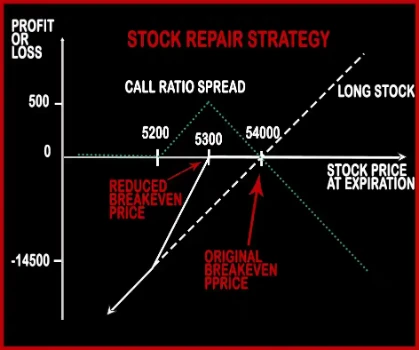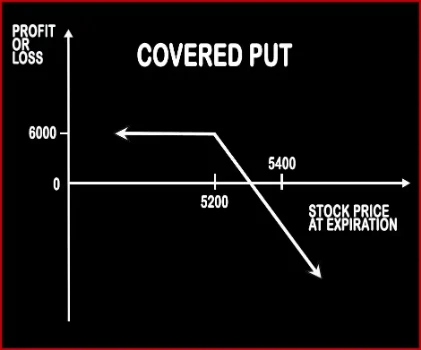Compare Strategies
| STOCK REPAIR | COVERED PUT | |
|---|---|---|

|

|
|
| About Strategy |
Stock Repair Option StrategyStock Repair Strategy is used to cover up for losses made on long stock position. After the long position suffered losses on stock price fall, a trader will implement this strategy in order to bring down the breakeven price and capping his further losses thereby increasing his probability of loss recovery. Suppose Mr. X has |
Covered Put Option StrategyThis strategy is exactly opposite to Covered Call Strategy. Here the investor is neutral or moderately bearish in nature and wants to take advantage of the price fall in the near future. The trader will short one lot of stock future. Now the trader will short ATM Put Option, the option strike price will be his exit price. If the prices rally above the strike price, the .. |
STOCK REPAIR Vs COVERED PUT - Details
| STOCK REPAIR | COVERED PUT | |
|---|---|---|
| Market View | Bullish | Bearish |
| Type (CE/PE) | CE (Call Option) | PE (Put Option) + Underlying |
| Number Of Positions | 3 | 2 |
| Strategy Level | Beginners | Advance |
| Reward Profile | Unlimited | Limited |
| Risk Profile | Limited | Unlimited |
| Breakeven Point | Futures Price + Premium Received |
STOCK REPAIR Vs COVERED PUT - When & How to use ?
| STOCK REPAIR | COVERED PUT | |
|---|---|---|
| Market View | Bullish | Bearish |
| When to use? | Stock Repair Strategy is used to cover up for losses made on long stock position. After the long position suffered losses on stock price fall, a trader will implement this strategy in order to bring down the breakeven price and capping his further losses thereby increasing his probability of loss recovery. | The Covered Put works well when the market is moderately Bearish. |
| Action | Buy 1 ATM Call, Sell 2 OTM Calls | Sell Underlying Sell OTM Put Option |
| Breakeven Point | Futures Price + Premium Received |
STOCK REPAIR Vs COVERED PUT - Risk & Reward
| STOCK REPAIR | COVERED PUT | |
|---|---|---|
| Maximum Profit Scenario | The profit happens when the price of the underlying moves above strike price of Short Put. | |
| Maximum Loss Scenario | Price of Underlying - Sale Price of Underlying - Premium Received | |
| Risk | Limited | Unlimited |
| Reward | Unlimited | Limited |
STOCK REPAIR Vs COVERED PUT - Strategy Pros & Cons
| STOCK REPAIR | COVERED PUT | |
|---|---|---|
| Similar Strategies | Bear Put Spread, Bear Call Spread | |
| Disadvantage | • Management required with all the positions. • Additional loss due to continuous decline in shares as downside risk remains unchanged. | • Limited profit, unlimited risk. • Trader should have enough experience before using this strategy. |
| Advantages | • This strategy creates an opportunity to recover losses by lowering our breakeven. • No margin required. • No additional downside risk and costs nothing to put on. | • Investors can book profit when underlying stock price drop, move sideways or rises by a small amount. • Able to generate monthly income. • Able to generate profit from fall in prices or mild increase in the prices. |